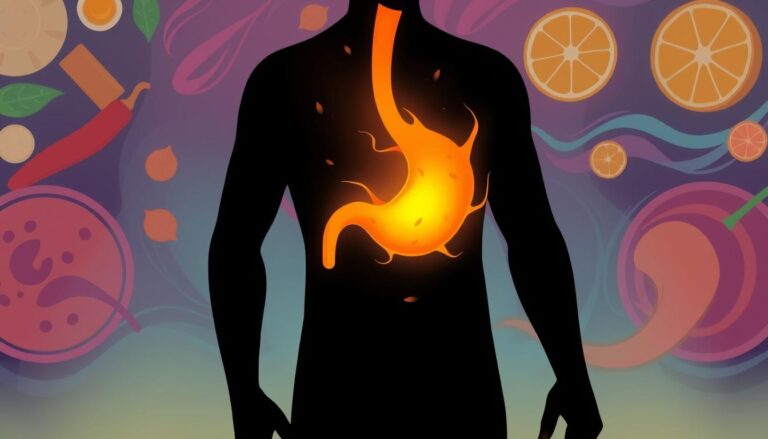Many Americans struggle with acid reflux and heartburn every day. While medicines can help, natural home remedies might be a better choice. This article will cover effective home remedies and lifestyle changes to ease acid reflux and heartburn symptoms. You’ll learn how to improve your digestive health on your own.
Key Takeaways
- Acid reflux is a common digestive issue caused by stomach acid backing up into the esophagus.
- Natural home remedies, such as dietary changes and lifestyle modifications, can effectively manage acid reflux symptoms.
- Maintaining a healthy weight, avoiding trigger foods, and practicing relaxation techniques can all contribute to reducing acid reflux episodes.
- Herbal remedies and supplements may also provide relief, but it’s important to consult with a healthcare professional before use.
- In some cases, seeking medical attention may be necessary to address underlying causes and explore additional treatment options.
Understanding Acid Reflux and Heartburn
Acid reflux, also known as gastroesophageal reflux disease (GERD), is a common digestive issue. It happens when the muscle at the esophagus’ base relaxes too much. This lets stomach contents flow back into the esophagus. This can cause a burning feeling in the chest, known as heartburn.
What is Acid Reflux?
Acid reflux occurs when the muscle between the stomach and esophagus doesn’t work right. It lets the stomach’s acidic contents flow back into the esophagus. This can be caused by certain foods, being overweight, pregnancy, or other health issues.
Symptoms of Acid Reflux and Heartburn
Heartburn is the main symptom of acid reflux and GERD. Other symptoms include:
- A bitter or sour taste in the mouth
- Difficulty swallowing
- Chest pain
- Regurgitation of food or liquid
- Hoarseness or sore throat
- Chronic cough or wheezing
These symptoms can be mild or severe. They may get worse when you lie down or eat certain foods. Knowing the causes and symptoms of acid reflux helps in managing and treating it.
Managing Weight to Reduce Acid Reflux
Keeping a healthy weight is key to managing acid reflux and heartburn. Carrying extra weight, especially around the stomach, puts pressure on your stomach. This can lead to more acid reflux. By eating well and exercising regularly, you can ease acid reflux symptoms and lower the risk of GERD.
Losing weight can help fight acid reflux and GERD. Just losing 10-15 pounds can make a big difference. This reduces the pressure on your stomach and esophagus, helping with digestion and less reflux.
To stay at a healthy weight, focus on eating right and exercising often. Choose foods like fruits, veggies, whole grains, and lean meats. Cut down on fatty, fried, and spicy foods that can make acid reflux worse. Regular exercise, like walking, swimming, or low-impact sports, helps burn calories and boosts your health.
Losing weight for GERD and handling excess weight and acid reflux takes time and effort. It’s about changing your lifestyle for the better. These changes can greatly reduce acid reflux’s impact on your life and improve your digestion.
Dietary Changes to Alleviate Acid Reflux
If you’re dealing with acid reflux, making smart food choices can help. By avoiding foods that trigger acid reflux and eating foods that are good for it, you can feel better. This can also boost your overall health.
Foods and Drinks to Avoid
Some foods and drinks can make acid reflux worse. These include:
- Tomato-based products
- High-fat foods, such as fried or greasy dishes
- Citrus fruits
- Carbonated and caffeinated drinks, including soda and coffee
- Chocolate
- Garlic and onions
- Alcohol
Staying away from these foods can lessen your heartburn and discomfort.
Beneficial Foods for Acid Reflux
On the other hand, eating foods that are good for acid reflux can help. Some good choices are:
- Low-fat, high-protein meals, such as lean meats, poultry, and fish
- Whole grains, such as brown rice and oats
- Vegetables, especially green leafy greens and other non-acidic options
- Ginger, which can help reduce inflammation and soothe the digestive system
- Chewing non-mint gum after meals, which can help keep acid out of the esophagus
By eating these foods, you can better manage your acid reflux and improve your digestive health.

Lifestyle Modifications for Acid Reflux Relief
Making changes to your daily habits can help ease acid reflux discomfort. Focus on what you eat and wear to manage this common issue.
Eating Habits and Portion Control
Eating smaller, more frequent meals can ease stomach strain. Overeating puts pressure on your digestive system, leading to acid reflux. By controlling your portions, you can lessen stomach overload and lower reflux risk.
Avoiding Tight Clothing and Belts
Your clothes affect your acid reflux symptoms. Tight items like belts and waistbands increase stomach pressure, causing acid to flow back up. Choose loose, comfy clothes that don’t squeeze your midsection. And skip the tight belts and waistbands.
These simple changes can help ease heartburn and other symptoms. Adjusting your eating and dressing habits can improve your acid reflux and digestion.
Home remedies for acid reflux
Many people find relief from acid reflux with natural home remedies. These remedies are not fully proven but some herbs and supplements help with gastroesophageal reflux disease (GERD) symptoms.
Herbal Remedies for Acid Reflux
Herbs like chamomile, licorice, marshmallow, and slippery elm have been used for centuries. They help with heartburn and GERD symptoms. These herbs may reduce inflammation, protect the esophageal lining, and neutralize stomach acid.
But, talk to your healthcare provider before trying these remedies. They might not mix well with your current medications.
Supplements for Acid Reflux
- Melatonin, a hormone that helps with sleep, might also ease GERD symptoms. It could improve the lower esophageal sphincter’s function and heal the esophageal lining.
- Some probiotic supplements could help people with acid reflux. They can balance gut bacteria and improve digestion.
Remember, these natural remedies can help but shouldn’t replace medical treatment for severe or ongoing GERD. Always talk to your healthcare provider before adding new supplements or herbal treatments.

Quitting Smoking for Better Digestive Health
If you struggle with acid reflux and heartburn, quitting smoking could change your digestive health for the better. Smoking weakens the muscle that keeps stomach acid from flowing back up. This can make smoking and acid reflux worse.
Stopping smoking and avoiding secondhand smoke can boost your digestive health. It also lowers the risk of GERD (gastroesophageal reflux disease) problems. Quitting smoking for GERD is key to managing symptoms and protecting your esophagus.
Smoking hurts your gut health too. Cigarettes contain chemicals that upset the balance of your gut bacteria. This can cause many digestive issues. Quitting smoking can help your digestive system and ease stomach and intestinal problems.

If you want better digestive health, talk to your doctor about quitting smoking for GERD. They can offer resources, support, and advice to help you quit. This can improve your overall health.
Stress Management and Relaxation Techniques
Stress and anxiety can make acid reflux worse by relaxing the esophageal muscles too much. To help, try stress management and relaxation methods like yoga, meditation, and deep breathing. These can make your digestion better.
Mind-body practices that make you more aware can really help with GERD symptoms.
Yoga and Meditation for Acid Reflux
Yoga and meditation are great for reducing stress for acid reflux. They help you relax deeply, which can lessen acid reflux. Regularly doing yoga and meditation also boosts your overall health and helps with heartburn.
Start with simple yoga poses like child’s pose, cat-cow, and supine twists. These help ease stomach pressure and aid digestion. Add meditation with deep breathing, body scans, and guided imagery to manage stress and GERD better.
Being consistent with these practices is important for GERD. Just a few minutes a day can greatly improve your digestion and overall health.
When to Seek Medical Attention
If you have ongoing or getting worse acid reflux symptoms, you should see a doctor. Home remedies and lifestyle changes can help with occasional heartburn. But, if you have severe or frequent acid reflux, you might need stronger treatments to avoid serious problems like [https://www.medicalnewstoday.com/articles/emergency-acid-reflux-symptoms]esophageal damage, ulcers, or even cancer.
Here are some signs that mean you should talk to a gastroenterologist:
- Daily or persistent acid reflux symptoms
- Difficulty swallowing
- Vomiting
- Unexplained weight loss
- New onset of heartburn in individuals over 60 years old
These symptoms could mean you have [https://www.medicalnewstoday.com/articles/emergency-acid-reflux-symptoms]gastroesophageal reflux disease (GERD). This is a chronic condition that can cause serious problems if not treated. Seeing a doctor can help figure out what’s causing your acid reflux and create a plan to manage it and prevent more damage.
Remember, while it’s normal to have heartburn sometimes, don’t ignore it if it keeps happening or gets worse. If you’re worried about your digestive health, [https://www.medicalnewstoday.com/articles/emergency-acid-reflux-symptoms]don’t hesitate to see a doctor.
Conclusion
Home remedies and natural treatments can help with acid reflux and heartburn. Making smart food choices and keeping a healthy weight are key steps. Adding herbal remedies and relaxation techniques also helps.
By changing your lifestyle and using natural methods, you can manage acid reflux well. Avoiding certain foods and managing stress are important. The remedies mentioned here give you many ways to fight acid reflux and heartburn.
If your symptoms don’t get better or get worse, you should see a doctor. They can help prevent serious problems and give you the right treatment.
Being proactive about your acid reflux can greatly improve your life. With the right food choices, lifestyle changes, and natural remedies, you can overcome acid reflux. This way, you can live without the pain of heartburn and other issues.
FAQ
What is acid reflux?
Acid reflux happens when the muscle at the top of the stomach relaxes too much. This lets stomach acid flow back up into the esophagus. It can cause a burning feeling, known as heartburn, which is a common symptom.
What are the symptoms of acid reflux and heartburn?
Symptoms include a burning feeling in the chest and neck. You might also taste something bitter or sour in your mouth. Difficulty swallowing and chest pain are other signs.
How can managing weight help reduce acid reflux?
Being overweight, especially around the stomach, can make acid reflux worse. Eating well and exercising can help. Losing weight if you’re overweight can also ease GERD symptoms.
What foods and drinks should I avoid to reduce acid reflux?
Some foods and drinks can make acid reflux worse. Stay away from tomato-based foods, high-fat foods, fried foods, citrus fruits, soda, caffeine, chocolate, garlic, onions, and alcohol. Cutting down on these can help.
What lifestyle changes can help alleviate acid reflux?
Changing how you eat and what you wear can help. Eat smaller meals more often to ease stomach pressure. Don’t lie down right after eating. Wear loose clothes and skip tight belts to reduce pressure.
What natural home remedies can be used to treat acid reflux?
Some people use natural remedies like chamomile, licorice, marshmallow, and slippery elm to ease GERD symptoms. Supplements like melatonin are also suggested, but their effectiveness varies.
How does quitting smoking affect acid reflux?
Smoking weakens the muscle that keeps stomach acid from flowing back up. Quitting smoking and avoiding secondhand smoke can reduce acid reflux and heartburn.
How can stress management and relaxation techniques help with acid reflux?
Stress can relax the esophageal muscles, causing acid reflux. Using stress-reducing activities like yoga, meditation, and deep breathing can help manage stress and improve digestion.
When should I seek medical attention for acid reflux?
If heartburn or acid reflux doesn’t go away or gets worse, see a doctor. Severe or frequent acid reflux needs medical treatment to prevent serious problems like esophageal damage or cancer.











Leave a Comment